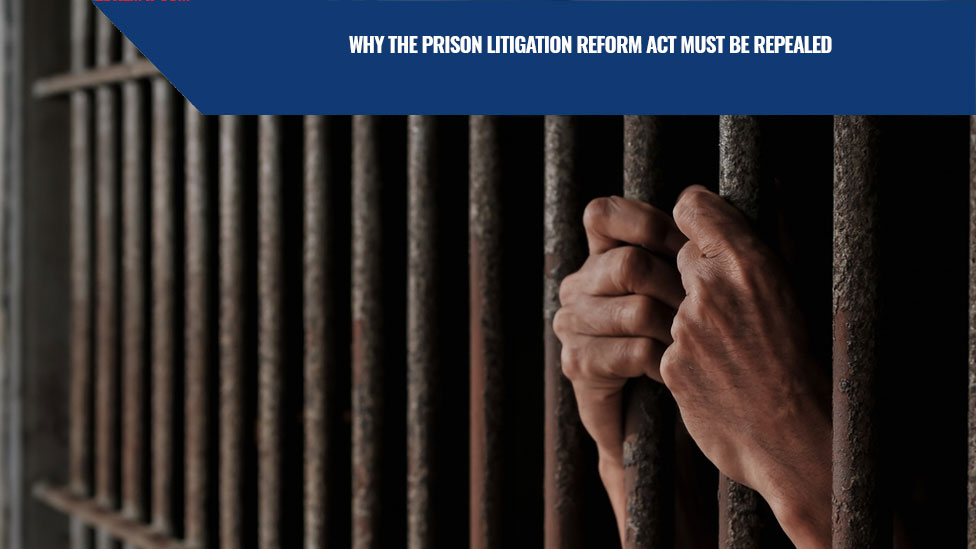On a weekly, and often daily basis, we hear from people incarcerated in this nation’s jails and prisons seeking help. We hear from people who are not receiving the medical care they need and who are terrified that they will suffer permanent injury from the jail or prison’s failures to properly provide necessary medical care (as they are constitutionally required to do), we hear from family members distraught over the beatings their loved ones are receiving in custody and desperate to find ways to help, we hear from people who have no access to potable water. And while we – a team of current justice warriors and former federal public defenders – want nothing more than to step in and help those who are too often unseen and unheard behind prison walls, the system makes it almost impossible to help.
It’s been over three years since the Prison Policy Initiative published “Slamming the Courthouse Door: 25 years of evidence for repealing the Prison Litigation Reform Act” by Andrea Fenster & Margo Schlanger. Ms. Fenster and Ms. Schlanger make a strong case for why the “reform” envisioned by the Prison Litigation Reform Act (PLRA) has only resulted in the “civil rights violations” happening in jails and prisons “never reach[ing] the public eye.” The report highlights how the PLRA came to life during “an era full of unfair, punitive, and racist criminal justice laws“.
For those of you unfamiliar with the PLRA, here is one example of how it effectively closes the courthouse door to injured detainees and prisoners. In order to even reach the merits of their claims, detainees and prisoners have to prove to the court that they have “exhausted” the administrative grievance process. Our local MCC San Diego explains the administrative grievance process to detainees in this way:
The Administrative Remedy Program is a process through which an inmate may seek formal review of issues related to their confinement. Prior to using the Administrative Remedy Program, you should initially attempt to resolve a problem informally through communication with a staff member, Inmate Request to Staff Member (copout) and Request for Informal Resolution. You should request a BP – 9 form, from your Correctional Counselor, if informal resolution proves unsuccessful. Once completed, the form should be returned to the Correctional Counselor who will deliver it, along with the proposed informal resolution, to the Administrative Remedy Coordinator. The deadline for completion of informal resolution and submission of the formal written Administrative Remedy Request, on the appropriate form (BP – 9), is 20 calendar days following the date on which the basis for the request occurred. The Warden has 20 calender days to respond from the day of filing. If you are not satisfied with the response to the BP – 9, an appeal may be filed, within 20 days, to the Regional Office, which has 30 days to respond. If you are not satisfied with the regional response, an appeal may be filed, within 30 days, to the General Counsel at Central Office, which has 40 days to respond. If the time period is not sufficient to make an appropriate decision, the time for response may be extended by 20 days at the institution level, 30 days at the regional level, and 40 days at the Central Office level. You will be notified of any extensions in writing by staff. The appropriate forms are available from your Correctional Counselor.
Huh? As someone with 20 years of formal education, I’m not sure I could properly comply with each and every step as laid out above. But if you do not complete each of these steps, and then pursue your claim all the way through the appellate process, you cannot pursue your claim in court. Or you can try, but your case will more likely than not be dismissed before what happened to you is even heard or considered by the court. If your cellmate looks deathly ill and cannot pursue a claim themselves, they’re out of luck because you can’t do it for them (28 CFR § 542.10 “An inmate may not submit a Request or Appeal on behalf of another inmate.”). We’ve acknowledged significant problems necessitating oversight of this nation’s prison system. It’s past time to reconsider the PLRA and to stop pretending that human rights violations affecting our brothers and sisters in custody are not our responsibility.
McKenzie Scott PC is a top-rated San Diego civil rights and criminal defense firm founded by Michele Akemi McKenzie and Timothy A. Scott – two former public defenders dedicated to “fighting for the little guy.”

